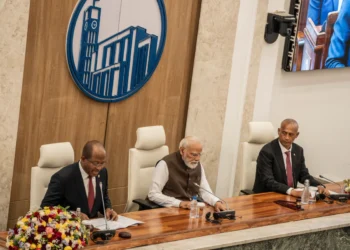By Emmanuel Nduka and Ere-ebi Agedah
Last Sunday, the Nigerian government expressed concerns and issued strong caveats about the rising threat of cyber-slavery in West Africa, which is increasingly targeting young people.
The country’s Ministry of Foreign Affairs raised alarm over reports of young Nigerians, including teenagers, being lured abroad with promises of well-paying jobs in cryptocurrency, only to be trafficked into forced labor in illegal “call centers” running cybercrime operations.
In a statement dished out on Sunday, Kimiebi Ebienfa, spokesperson for the ministry remarked that these operations—referred to as “419 cyber-scam factories”—coerce victims into sending fraudulent emails, text messages, and making scam calls aimed at defrauding innocent people worldwide. The victims often face extreme working conditions, with little to no hope of escape.
The ministry also highlighted a recent rescue operation in Accra, Ghana, where the Economic and Organised Crimes Office (EOCO) freed a group of Nigerian citizens who had been trafficked into one of these operations.
Fast-forward to the recently botched CBEX scam, West Africans, particularly Nigerians, appear not to have learnt from the past. In recent years, fraudulent cyber-investments and Ponzi schemes have become a significant threat to the financial stability of Western African nations. Despite numerous high-profile scams and a history of devastating losses, many individuals continue to fall prey to these deceptive schemes. Whether it’s the notorious MMM that took millions in the 2010s or the more recent CBEX scam that robbed unsuspecting victims, the pattern remains the same. False promises of high returns on investments, rapid growth in a short period, and a massive loss of funds when the scheme collapses.
Despite the heavy toll these scams take on individuals and communities, there seems to be a widespread ‘daft’ refusal to learn from past experiences, allowing fraudsters to continue exploiting vulnerable populations.
Growth Of Fraudulent Cyber-Investments In Western Africa
Western Africa has become a hotspot for fraudulent financial schemes, often disguised as legitimate investment opportunities. These schemes rely on sophisticated digital platforms that promise high returns with little risk, attracting both seasoned investors and unsuspecting individuals looking for a quick way out of poverty. With the increasing penetration of mobile internet and the digital economy in the region, scammers are capitalizing on the lack of financial literacy and the low barriers to entry into the online investment world.
One of the most infamous examples of such schemes was MMM, a Russian Ponzi scheme that made its way to Western Africa in 2015. The MMM scheme alone ensured that between 5 to 10 million people including Africans, lost their life savings. Initially promoted as a “peer-to-peer” investment platform, MMM claimed to offer returns of up to 30% monthly. The platform promised to connect investors with others who were in need of “financial help,” but the reality was that the returns were paid using the funds of new investors. When the scheme inevitably collapsed, millions of West Africans were left destitute. Yet, despite its infamous failure, similar schemes continue to flourish.
The CBEX scam is a more recent example of this trend. CBEX, a cryptocurrency-based Ponzi scheme, gained traction in countries like Nigeria, Ghana, and Cameroon. Before it collapsed on April 15 just recently, it was first launched in July 2024. It promised massive returns from trading and staking digital currencies. However, CBEX has been exposed as a fraudulent operation, with investors losing hundreds of millions of dollars. As reported by Business Insider Africa, between 250,000 to 300,000 Nigerians made financial investments into CBEX, amounting to up to N1.3trilion in loses.
Operating under the façade of a legitimate business across Lagos, Abuja, and Oyo states, CBEX lured investors with promises of high yields before suddenly folding, wiping out over $850 million in savings and triggering widespread outrage, particularly within the downstream oil and gas sector. Shockingly, despite its collapse, some individuals continue to believe in its return, underlining the region’s struggle with learning from past mistakes.
The Mechanics Behind Ponzi Schemes And Cyber Fraud
Ponzi schemes and fraudulent investment platforms share common characteristics and operate without proper regulation or oversight. They leverage on false promises, digital platforms, recruit new investors, collapse, and then deploy psychological manipulation.
While these schemes are dangerous and devastating, the failure to learn from past mistakes speaks to a deeper issue in many African societies—the persistence of “get-rich-quick” mentalities. Western African nations are home to some of the fastest-growing population of young and vibrant minds, but economic opportunities have failed to keep pace, leading many to view scams as viable financial opportunities. In countries where poverty and unemployment rates are high, and financial literacy is often low, these schemes appear to be a path to upward mobility.
There is also a pervasive culture of denial among victims and communities. When a Ponzi scheme collapses, the victims often rationalize their involvement by blaming others, often pointing to “other people” as the ones who ran off with their funds. This communal defensiveness inhibits accountability and encourages people to keep looking for the next big thing without considering the consequences.
Moreover, the lack of regulatory frameworks in many African countries exacerbates the situation. Financial authorities in the region are often ill-equipped to regulate digital investment platforms or to pursue the criminals behind these scams. This creates a fertile ground for fraudsters to operate with impunity, further fueling the cycle of victimization.
CBEX’s downfall is just the latest in a long list of notorious scams that have preyed on Nigerians’ trust and financial desperation. After MMM Nigeria, other schemes like Chinmark Group, MBA Forex, and Ovaioza Farm Produce Storage Business, all thrived with disturbingly persistent traits.
Economic, Social Impact Of These Scams
The impact of fraudulent cyber-investments and Ponzi schemes on individuals and communities cannot be overstated. When these scams collapse, they leave behind widespread financial ruin. Families lose their savings, small businesses are bankrupted, and communities are devastated. The social fabric is often torn apart as individuals struggle to cope with the psychological and financial aftermath of their involvement in these schemes.
The broader economic impact is also severe. The proliferation of these schemes has led to a lack of trust in legitimate financial institutions, hindering economic development. People become disillusioned with traditional banks and investment methods, opting instead for dubious, high-risk ventures in hopes of finding quick solutions to their financial woes. This undermines legitimate investment opportunities and stifles sustainable economic growth.
The Road Ahead: What Must Be Done?
In its counsel to Nigerians last Sunday, the Nigerian government advised its citizens to be wary of offers that promise quick money or overseas opportunities, particularly those linked to cryptocurrency. Citizens were advised to verify all offers through official channels and report any suspicious cases to authorities. However, regulatory gaps and slow enforcement action by authorities have emboldened scammers. Although agencies like the Securities and Exchange Commission (SEC) and the Economic and Financial Crimes Commission (EFCC) occasionally intervene, the reactive approach often comes only after significant damage has been done.
The SEC has publicly maintained that the CBEX scheme was unlicensed and had no official permission to participate in Nigeria’s capital market. But the issue of fraudulent cyber-investments and Ponzi schemes will not disappear on its own. A victim of the scheme who lost $1060, claimed that he saw “CAC Certificates” on the walls of CBEX offices. With at least N1.3trillion of Nigerian funds lost to CBEX, the SEC concluded last week that recovery of lost funds remains “impossible”. “CBEX wouldn’t have successfully scammed Nigerians if the government did its job by running background checks and ensuring that it’s safe for the masses to invest. The government is nothing but a sorry excuse for leadership,” Daniel Regha, a societal critique wrote on X last week.
A multi-pronged approach is needed to address this growing crisis. Enhanced financial education, stronger regulatory oversight, safe investment practices, community engagement and accountability are strategies that may give a safe landing. Most importantly, there must be a cultural shift away from the “get-rich-quick” mentality. Community leaders, influencers, and educators must work together to foster a culture of patience, responsible investing, and financial diligence.
While the persons declared wanted by the EFCC over the CBEX scam remain at large, the persistence of fraudulent cyber-investments and Ponzi schemes in Western Africa is not just a financial issue—it’s a societal crisis. Until there is a concerted effort to address the root causes, the cycle of fraud will continue to plague the region. It’s time for the region to move beyond the allure of easy money and embrace the hard-earned, sustainable path to financial prosperity.


































